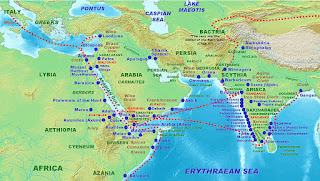The St. Thomas Christians, also known as Nasranis (Followers of The Nazarene), are an ancient Christian community in India whose tradition traces its origin to the Apostle Thomas. According to tradition, St. Thomas arrived in the southwestern coast of India in the 1st century AD and evangelized in various regions. The St. Thomas Christians have a rich history, unique traditions, and a distinct form of Christianity within the broader Indian context. Here are some key aspects of their faith:
Apostolic Connection: St. Thomas Christians claim a direct apostolic connection to St. Thomas, affirming that he established Christian communities in India. This tradition is foundational to their identity and is reflected in the name "St. Thomas Christians."
Liturgical Heritage: St. Thomas Christians have a distinctive liturgical heritage that combines elements of Eastern Christianity with indigenous Indian customs. They follow various liturgical traditions, including the East Syriac Rite and West Syriac Rite, and use Syriac, Malayalam, and other languages in their worship.
Syriac Influence: The Syriac Christian influence on St. Thomas Christians is notable, and Syriac remains an important liturgical and cultural language for them. The use of Syriac in their worship distinguishes them from other Christian communities in India.
Ecclesiastical Independence: Historically, the St. Thomas Christians were connected to the Church of the East but gradually developed their ecclesiastical structures. Over time, divisions and affiliations with different Christian denominations occurred, leading to the existence of various St. Thomas Christian denominations today, including the Syro-Malabar Catholic Church and the Malankara Orthodox Syrian Church.
Cultural Integration: St. Thomas Christians have integrated Indian cultural elements into their Christian practices. This fusion is evident in their art, architecture, and celebrations. The blending of Indian traditions with Christianity has resulted in a unique cultural expression.
Religious Tolerance: The history of St. Thomas Christians includes interactions with various religious communities in India. Their traditions reflect a degree of religious tolerance and accommodation, allowing for a distinctive coexistence with the diverse religious landscape of India.
Contributions to Christianity in India: St. Thomas Christians have made significant contributions to the growth of Christianity in India. They played a role in early evangelization and continue to contribute to theological, educational, and social aspects of Indian Christianity.
While the St. Thomas Christian community is diverse with various denominations and traditions, their shared heritage and apostolic origin continue to shape their faith and identity in the context of India's religious and cultural diversity.




